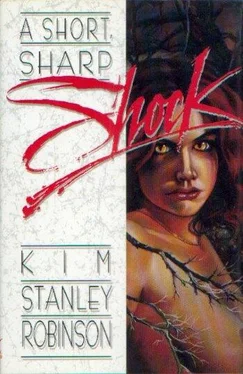Eventually he stood chest high in the waves’ troughs, then waist high; but it was too much work to stand, and too cold. He crouched down in the water and let the float and rope hold him, peering through the blackness for the next onrushing wall of Whitewater.
Finally the broken waves themselves were low enough that he could float over them, his head clear; and in the troughs the Whitewater only sluiced over his knees. He hauled himself up the rope toward the knob, where it was shallower still; he could sit, and turn his back to the waves and the wind. Relaxing his stomach muscles made him retch. When he had gathered some strength he hauled himself up onto the knob, and found the other anchors, and slogged down the length of Garth’s rope; out in the murk he could see Garth bobbing.
But it was only his float. “No,” Thel said. Rather than return to the knob he just swung on his rope sideways, and bumped into Birsay unexpectedly; but Birsay hung in his float, head back, mouth and eyes wide open to the waves. He had drowned.
Stomache spasming, Thel swung back the other way, stepping on sharp rock. No sign of the swimmer. Back, forth, up, back: nothing. He had to walk back to the knob and find her anchor. The rope hung loose in the water, trailing out to sea, and he hauled it in feeling like Death the Fisherman, afraid and sick at heart. Its end came to him, frayed. In the first predawn blue he peered at the ends of the fibers; it looked like she had chewed through the rope, bitten her way free. The swimmer. He kneeled on the rock, collapsing around his cramped stomach. The swimmer. She had freed herself but kept the float, smart woman. Perhaps she had swum over and pulled Garth from his float, yes. Took them both off the bar, offto where the ground swell would pose no challenge to her swimming powers. Yes. She would come back. Or else swim to the cape in the west.
When dawn illuminated the seascape the tide had ebbed and the brough had returned, though it was often overrun by the storm surf. Everything today was green, the sea a light jade color, the clouds a heavy dark gray tinged with green, the bar brown, but greenish as if with algae.
Thel untied the float from his chest and tossed it aside. Angrily he kicked Birsay’s anchor, left him bobbing in the waves. He put his bags over his shoulder, the mirror like a heavy plate in its wet sack. He took off along the bar, squish squish.
Itwas hard to walk. Often he got off Birsay’s path and fell in knee-deep transverse crevices, cracking his shins so hard that the world itself burst with pain, as it had when he was shoved through the mirror. The wind keened across the brough, in his ear and cold. It rained intermittently and clouds rushed overhead like the horses of the face-women. Several times he heard the swimmer and Garth calling to him from the surf to his left, but he never saw them. The current in the southern sea was running swiftly toward the cape to the west, which now appeared as a dark hill in the clouds. A good sign, it would help them along. He drank seawater, he was so thirsty; he drank the blood from his shins for food, cupping it in a palm and getting a good mouthful after every fall. Its taste reminded him of Garth’s fruit. Blindly he kicked on, and then the brough was sand. He ate some of it. The mirror was heavy on his back, he wanted to toss it aside but didn’t.
He lay on the cape beach, in wet sand. Sand crabs hopped around him, tried to eat him and he ate them in return. Along the southern side of the cape, that was where they would land. A beach stream, fresh water cutting through the shingle. He lay in it and drank. When he woke again he was stronger, and could bury himself in the sand and sleep properly. The next day he found abalone studding a beach reef like geodes, and he broke them with rocks and ate the muscles after pounding them tender. That and the beach stream infused him with strength, and he began walking the cape’s broad southern beach, under the steep green prow of the reemerging peninsula. The beach was dotted with pools of water blue as the sky, and with driftwood logs from what,had been immense trees, and with shell fragments that were sometimes big enough to sit in. All kinds of debris, on fine tawny sand, loose underfoot so that he often stumbled, and sometimes fell. All kinds of debris: and yet when he came across one piece of driftwood, he knew it instantly. It was the remains of a shrub, stripped of leaves and bark—a thin trunk dividing into thinner branches, their broken ends rounded and smooth as if rolled in the waves for years. Just a sand-colored piece of driftwood, a splay of branches like a hand reaching out. He sat on the sand and wept.
He wandered the beaches on the southern side of the cape, and during each low tide ventured back out on the brough, looking for signs of the swimmer. In the evenings he grubbed on a beach of oval flat stones for crabs, and cracked more abalone, and felt a traitor to Garth and the swimmer every time he swallowed. He hated his hunger then, the way it drove him, the way he was its slave. The days were so long. During one he sat in the sand at the tip of the cape, on the edge of the prow that rose out of the sea to a grassy peak some five hundred feet above; and each part of that day passed like a year of grieving.
The next day he climbed the grassy peak. When he reached the top he could see far over the brough, a dark swath in the sea studded with whitecaps. It was an overcast day, the sun a white smeary blob and the sky like the inside of an abalone shell, arched over a sea of lead. The brough seemed to disappear out at the horizon, with no sign of the peninsula on the other side, as if the peninsula were sinking as he passed, sinking and disappearing forever, so that even if he walked around the world he would only someday come to a final cape, with the empty sea beyond and the land he stood on sinking.
As blank and bleached as a fragment of driftwood, he sat and let waves break on his head. He drank the salty tide until he could drink no more, threw it up, crawled to the beach stream to drink. One afternoon it occurred to him that the currents could have shifted, she could have come ashore on the north beaches, or been swept by currents far down the peninsula to the west, past him. Those small white teeth chewing away at the rope—surely such pure will had lived! Surely the will to survive had something to do with survival!
Next morning he walked west on the spine, investigating every cove beach tucked out of the view of the crest trail. Days passed like that, he no longer remembered much of the night of the storm, it was too much like the memory of a dream, vague, incoherent, illuminated in flashes, intensely disturbing. We forget dreams, he thought, because they are too vivid to face. He sometimes had trouble remembering what had happened to him on the peninsula before the storm; once he couldn’t recall what he was looking for, it was just something he did, climb up and down rocks step after step, looking closely at the margin of sea and shore, searching for patterns in the sand. Clouds rolled overhead, west to east in their own frilly ground swell, wave after wave of fronts, the masses of warm air wedging under the cold air and then rising like bubbles up through that drafty emptiness, clouds burgeoning into existence as the warm air expressed its watery milk.
For a week the sunsets were purest pink. Why in perfectly clear air some sunsets were pink, others bronze, others purple: he pondered that through many dusks, tending fires of driftwood started with a lens of clear glass he had found beachcombing. Through the long days he hiked westward and westward, roving from shore to shore. It was a task, a filling of the hours, a compulsion, a destiny. Kicking the rocks with the toe of his boot he heard chants come from his own mouth, wordless grunts, howls of pain, broken phrases: “And that. And that. And that. And that. And…”
Читать дальше












